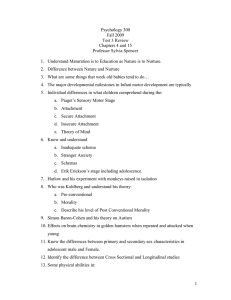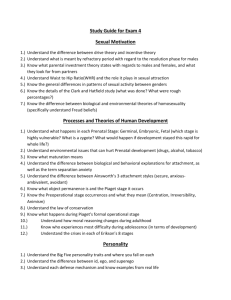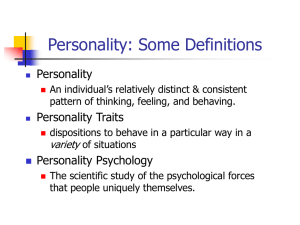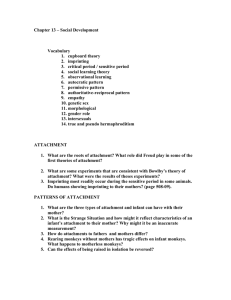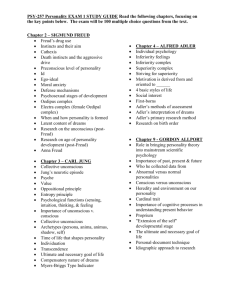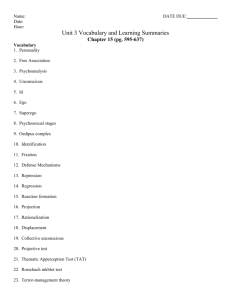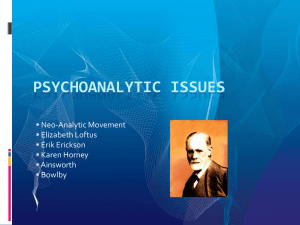AP Psychology 2015-2016 Chapters 11& 12
advertisement
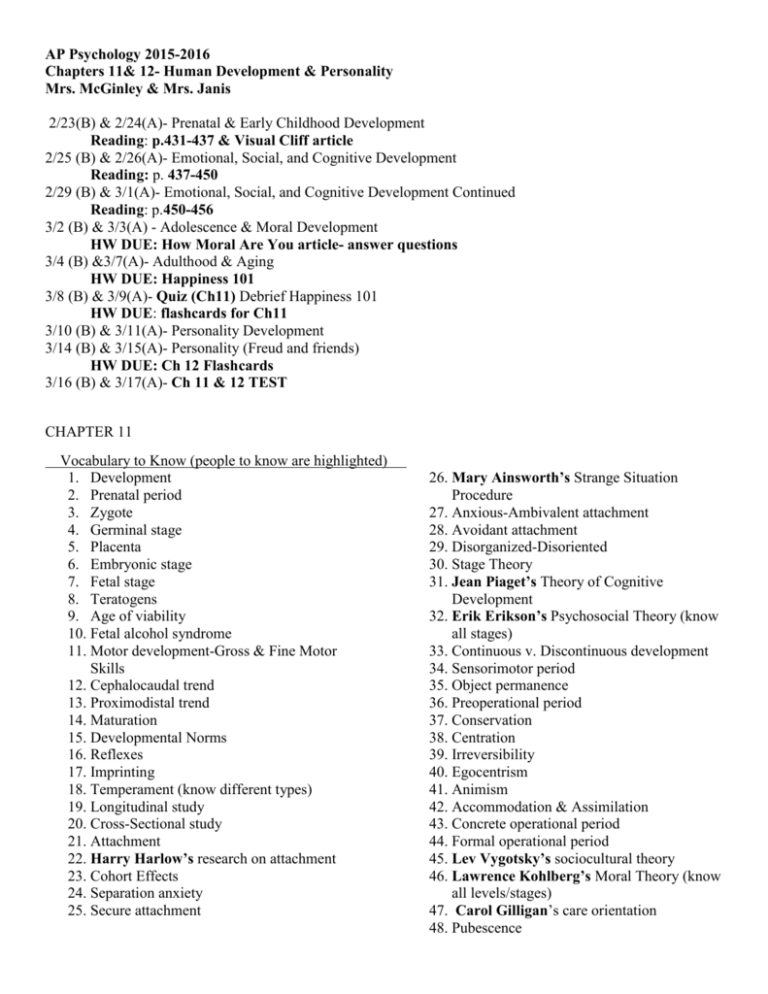
AP Psychology 2015-2016 Chapters 11& 12- Human Development & Personality Mrs. McGinley & Mrs. Janis 2/23(B) & 2/24(A)- Prenatal & Early Childhood Development Reading: p.431-437 & Visual Cliff article 2/25 (B) & 2/26(A)- Emotional, Social, and Cognitive Development Reading: p. 437-450 2/29 (B) & 3/1(A)- Emotional, Social, and Cognitive Development Continued Reading: p.450-456 3/2 (B) & 3/3(A) - Adolescence & Moral Development HW DUE: How Moral Are You article- answer questions 3/4 (B) &3/7(A)- Adulthood & Aging HW DUE: Happiness 101 3/8 (B) & 3/9(A)- Quiz (Ch11) Debrief Happiness 101 HW DUE: flashcards for Ch11 3/10 (B) & 3/11(A)- Personality Development 3/14 (B) & 3/15(A)- Personality (Freud and friends) HW DUE: Ch 12 Flashcards 3/16 (B) & 3/17(A)- Ch 11 & 12 TEST CHAPTER 11 Vocabulary to Know (people to know are highlighted) 1. Development 2. Prenatal period 3. Zygote 4. Germinal stage 5. Placenta 6. Embryonic stage 7. Fetal stage 8. Teratogens 9. Age of viability 10. Fetal alcohol syndrome 11. Motor development-Gross & Fine Motor Skills 12. Cephalocaudal trend 13. Proximodistal trend 14. Maturation 15. Developmental Norms 16. Reflexes 17. Imprinting 18. Temperament (know different types) 19. Longitudinal study 20. Cross-Sectional study 21. Attachment 22. Harry Harlow’s research on attachment 23. Cohort Effects 24. Separation anxiety 25. Secure attachment 26. Mary Ainsworth’s Strange Situation Procedure 27. Anxious-Ambivalent attachment 28. Avoidant attachment 29. Disorganized-Disoriented 30. Stage Theory 31. Jean Piaget’s Theory of Cognitive Development 32. Erik Erikson’s Psychosocial Theory (know all stages) 33. Continuous v. Discontinuous development 34. Sensorimotor period 35. Object permanence 36. Preoperational period 37. Conservation 38. Centration 39. Irreversibility 40. Egocentrism 41. Animism 42. Accommodation & Assimilation 43. Concrete operational period 44. Formal operational period 45. Lev Vygotsky’s sociocultural theory 46. Lawrence Kohlberg’s Moral Theory (know all levels/stages) 47. Carol Gilligan’s care orientation 48. Pubescence 49. Secondary Sex Characteristics 50. Puberty 51. Primary sex characteristics 52. Menarche 53. Spermarch 54. Prefrontal cortex in adolescence 55. James Marcia’s identity statuses (know all) 56. Empty nest 57. Midlife crisis 58. Menopause 59. Dementia 60. Fluid Intelligence 61. Crystallized Intelligence 62. Parenting Styles: Authoritarian, Authoritative, Permissive 63. Elisabeth Kubler-Ross’ Stages of Accepting Death 64. Gender differences 65. Gender stereotypes 66. Gender roles 67. Socialization CHAPTER 12 Vocabulary to Know 1. Personality 2. McCrae & Costa’s Five-Factor Model 3. Personality Trait 4. Psychoanalytic/psychodynamic Theory 5. Sigmund Freud 6. Id, Ego, Superego 7. Pleasure Principle 8. Reality Principle 9. Conscious, Preconscious, Unconscious 10. Carl Jung’s Analytical Psychology 11. Collective Unconscious 12. Personal Unconscious 13. Archetypes 14. Defense Mechanisms: Repression, Projection, Displacement, Sublimation, Reaction Formation, Regression, Rationalization, Identification 15. Psychosexual Stages: Oral, Anal, Phallic, Latency, Genital 16. Fixation 17. Libido 18. Oedipus & Electra Complex 19. Alfred Adler’s Individual Psychology 20. Striving for superiority 21. Compensation 22. Birth Order 23. Behaviorism perspective 24. BF Skinner’s views on personality (determinism & response tendencies) 25. Albert Bandura- reciprocal determinism 26. Self-efficacy 27. Walter Mischel & person-situation controversy 28. Humanism perspective 29. Carl Roger’s person centered theory 30. self-concept 31. incongruence 32. Abraham Maslow’s theory of self actualization
